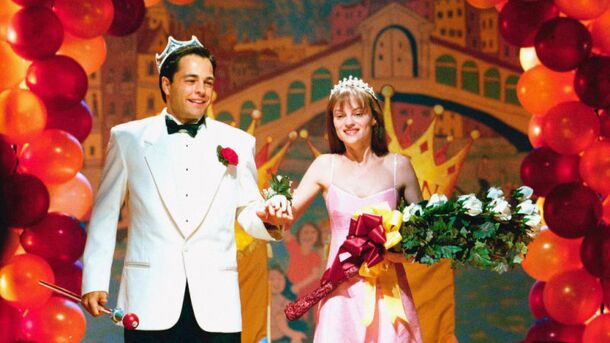The Secretly Best Adaptation of Stephen King's Carrie You've Never Watched

It is a must-watch for all fans of the King of Horror.
Summary
In 1974, a market-changing event occurred in the publishing industry. The novel with the simple title of Carrie saw the light of day, revolutionizing the horror genre and transforming Stephen King from an unknown rookie author into a household name. Even today, King's debut novel remains one of the most recognizable of his multiple (65!) works.
The image of a teenager covered in blood has become a pop culture phenomenon in its own right, used in numerous horror and thriller projects (Netflix 's Wednesday, for example).
Whopping Number of Adaptations
Naturally, the hit story of an abused schoolgirl with secret superpowers who takes revenge on her bullies and entire town has been adapted for screen and stage more than once. All in all, the Carrie franchise includes four movies, three musicals and a Riverdale special (S2E18).
If you're a horror fan, you've probably seen the classic 1976 adaptation starring Sissy Spacek and its sequel, The Rage: Carrie 2, about Carrie's half-sister with the same destructive powers. If you are a casual moviegoer, you must have watched the 2013 remake starring Chloë Grace Moretz in cinemas.
It is usually these two that are mentioned in various fan discussions. Many viewers tend to forget that there was another Carrie adaptation, which for Stephen King fans might actually be the best of the franchise.
The Most Faithful Adaptation
In 2002, Bryan Fuller, known for Hannibal and Star Trek projects, and David Carson, who has directed many films and series for television, made their own version of Carrie for NBC. And this version is the most faithful to the source material.
The film is far from perfect. The flaws that can be expected from a direct-to-TV adaptation include poor special effects, uneven storytelling despite the longer running time (the story is mostly told in flashbacks), and a somewhat corny score. But these shortcomings are compensated for by the brilliant acting of Angela Bettis as the title character and by canonical scenes that other Carrie films have chosen to omit.
For example, we see the rain of stones that manifests because of Carrie's anger at her mother, and the blowing up of the entire town after the horrendous prom night. Also, Carrie's mother dies the book way (the girl stops her heart) instead of the more picturesque way shown in other adaptations.
The only thing that is completely different from the source is the ending. While in the novel Carrie dies (her death certificate is shown), Bettis' version is saved by the secondary protagonist Sue Snell, which feels a bit off the general tone of the story.
In any case, with all its flaws, 2002's Carrie remains the closest thing to a Stephen King classic. So every horror fan should check it out at least once.